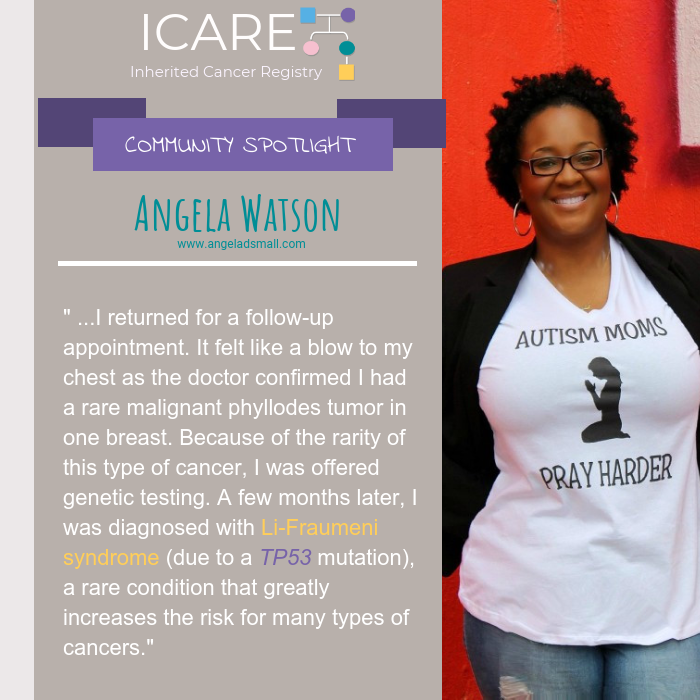 Life was great at 45. I had nothing more than a few headaches and was a tad overweight. After a friend was diagnosed with breast cancer, I realized I had not had a mammogram in a couple of years, so I scheduled an appointment. One mass was found, but it was benign and nothing to worry about. The mass continued to grow, and again, a biopsy confirmed it was benign. The mass was removed, and I went on with my life. A few months later, I returned for a follow-up appointment. It felt like a blow to my chest as the doctor confirmed I had a rare malignant phyllodes tumor in one breast. Because of the rarity of this type of cancer, I was offered genetic testing. A few months later, I was diagnosed with Li-Fraumeni syndrome (due to a TP53 mutation), a rare condition that greatly increases the risk for many types of cancers.
Life was great at 45. I had nothing more than a few headaches and was a tad overweight. After a friend was diagnosed with breast cancer, I realized I had not had a mammogram in a couple of years, so I scheduled an appointment. One mass was found, but it was benign and nothing to worry about. The mass continued to grow, and again, a biopsy confirmed it was benign. The mass was removed, and I went on with my life. A few months later, I returned for a follow-up appointment. It felt like a blow to my chest as the doctor confirmed I had a rare malignant phyllodes tumor in one breast. Because of the rarity of this type of cancer, I was offered genetic testing. A few months later, I was diagnosed with Li-Fraumeni syndrome (due to a TP53 mutation), a rare condition that greatly increases the risk for many types of cancers.
I have three children ages 11, 22, and 27. My 11-year-old was diagnosed with autism at age 3, which has prepared me to advocate like no other. Although there is so much more to my story, when faced with challenges, I prefer to come through and share the answers I have collected throughout my journey. I’m just starting, but here are a few tips I have used to cope:
- Brainstorm your thoughts in a journal. I have learned there are so many things I can’t control, but so many more that I can.
- Get your life in order and encourage your family and friends to do the same. With or without Li-Fraumeni syndrome, we are all guaranteed a death which can happen at any moment. As crazy as it sounds, while journaling, I realized that death was not my real fear. My real fear was leaving my son, and what his life would look like if I was not here to take care of him. Insurance policies, wills, trusts, and written expectations for my son are no longer something just on a to-do list.
- Get organized. I’m still figuring this out, but the appointments and test results can take over your life quite literally. Getting a calendar and establishing systems that work for you is a must.
- Research solutions and take an active role in your care. Ask questions no matter how silly they may seem. Always ask, “Is that the best we can do, and what are my other options?”
- Take your time when making decisions. Never allow anyone to pressure you into making a decision. Sometimes you have to take a step back and seek wise counsel.
- Create a “worry” section in your journal. As things pop up in my mind, I write them in the “worry” section of my journal and tell those thoughts that we can talk about them later during my worry time. “Worry time” is time I set aside to worry so that my day is not consumed with worry, which helps me stay focused on positive things. Typically, by the time “worry time” comes around, I have either found a solution, or I’m over it!
- This probably should have been number 1 on the list but seek therapy. A few weeks in I realized the thoughts about “what if” were consuming me. Depression is real. Get a good therapist. It may take several sessions with several therapists but talking it out can be a game changer.
Hope this helps because I’m out of space. Sending great vibes and love your way!
―ICARE participant, Angela Watson, from Memphis, Tennessee
